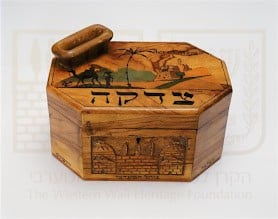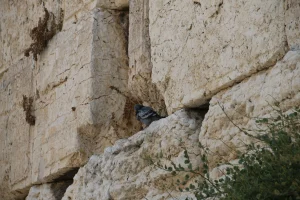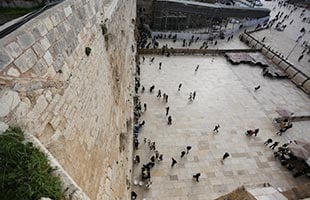These are the rules that you shall set before them:
When you acquire a Hebrew slave, that person shall serve six years—and shall go free in the seventh year, without payment.
If [a male slave] came single, he shall leave single; if he had a wife, his wife shall leave with him.
If his master gave him a wife, and she has borne him children, the wife and her children shall belong to the master, and he shall leave alone.
But if the slave declares, “I love my master, and my wife and children: I do not wish to go free,”
his master shall take him before God. He shall be brought to the door or the doorpost, and his master shall pierce his ear with an awl; and he shall then remain his master’s slave for life.
When a parent sells a daughter as a slave, she shall not go free as other slaves do.
If she proves to be displeasing to her master, who designated her for himself, he must let her be redeemed; he shall not have the right to sell her to outsiders, since he broke faith with her.
And if the master designated her for a son, he shall deal with her as is the practice with free maidens.
If he takes another [into the household as his wife], he must not withhold from this one her food, her clothing, or her conjugal rights.
If he fails her in these three ways, she shall go free, without payment.
One who fatally strikes another party shall be put to death.
If [a man] did so but not by design—it came about by an act of God—I will assign you a place to which he can flee.
When one party schemes against another and kills through treachery, you shall take that person from My very altar to be put to death.
One who strikes one’s father or mother shall be put to death.
One who kidnaps another party—whether having sold or still holding the victim—shall be put to death.
One who insults one’s father or mother shall be put to death.
When [two] parties quarrel and one strikes the other with stone or fist, and the victim does not die but has to take to bed.
if that victim then gets up and walks outdoors upon a staff, the assailant shall go unpunished—except for paying for the idleness and the cure.
When a slave-owning party strikes a slave, male or female, with a rod, who dies there and then, this must be avenged.
But if the victim survives a day or two, this is not to be avenged, since the one is the other’s property.
When [two or more] parties fight, and one of them pushes a pregnant woman and a miscarriage results, but no other damage ensues, the one responsible shall be fined according as the woman’s husband may exact, the payment to be based on reckoning.
But if other damage ensues, the penalty shall be life for life,
eye for eye, tooth for tooth, hand for hand, foot for foot,
burn for burn, wound for wound, bruise for bruise.
When a slave-owning party strikes the eye of a slave, male or female, and destroys it, that person shall let the slave go free on account of the eye.
If the owner knocks out the tooth of a slave, male or female, that person shall let the slave go free on account of the tooth.
When an ox gores a man or a woman to death, the ox shall be stoned and its flesh shall not be eaten, but the owner of the ox is not to be punished.
If, however, that ox has been in the habit of goring, and its owner, though warned, has failed to guard it, and it kills a man or a woman—the ox shall be stoned and its owner, too, shall be put to death.
If ransom is imposed, the owner must pay whatever is imposed to redeem the owner’s own life.
So, too, if it gores a minor, male or female, [its owner] shall be dealt with according to the same rule.
But if the ox gores a slave, male or female, [its owner] shall pay thirty shekels of silver to the master, and the ox shall be stoned.
When any party opens a pit, or when any party digs a pit and does not cover it, and an ox or an ass falls into it,
the one responsible for the pit must make restitution—paying the price to the owner, but keeping the dead animal.
When any party’s ox injures a neighbor’s ox and it dies, they shall sell the live ox and divide its price; they shall also divide the dead animal.
If, however, it is known that the ox was in the habit of goring, and its owner has failed to guard it, that person must restore ox for ox, but shall keep the dead animal.
When any party steals an ox or a sheep, and slaughters it or sells it, that person shall pay five oxen for the ox, and four sheep for the sheep.—
If the thief is seized while tunneling and beaten to death, there is no bloodguilt in that case.
If the sun had already risen, there is bloodguilt in that case.—[The thief] must make restitution, and if lacking the means, shall be sold for the theft.
But if what was stolen—whether ox or ass or sheep—is found alive and in hand, that person shall pay double.
When any party who owns livestock lets it loose to graze in another’s land, and so allows a field or a vineyard to be grazed bare, restitution must be made for the impairment of that field or vineyard.
When a fire is started and spreads to thorns, so that stacked, standing, or growing grain is consumed, the one who started the fire must make restitution.
When any party gives money or goods to another for safekeeping, and they are stolen from that other party’s house: if caught, the thief shall pay double;
if the thief is not caught, the owner of the house shall depose before God and deny laying hands on the other’s property.
(In all charges of misappropriation—pertaining to an ox, an ass, a sheep, a garment, or any other loss, whereof one party alleges, “This is it”—the case of both parties shall come before God: the one whom God declares guilty shall pay double to the other.)
When any party gives to another an ass, an ox, a sheep or any other animal to guard, and it dies or is injured or is carried off, with no witness about,
an oath before יהוה shall decide between the two of them that the one has not laid hands on the property of the other; the owner must acquiesce, and no restitution shall be made.
But if [the animal] was stolen from the guardian, restitution shall be made to its owner.
If it was torn by beasts, the guardian shall bring it as evidence—not needing to replace what has been torn by beasts.
When any party borrows [an animal] from another and it dies or is injured, its owner not being with it, restitution must be made.
If its owner was with it, no restitution need be made; but if it was hired, that payment is due.
If a man seduces a virgin for whom the bride-price has not been paid, and lies with her, he must make her his wife by payment of a bride-price.
If her father refuses to give her to him, he must still weigh out silver in accordance with the bride-price for virgins.
You shall not tolerate a sorceress.
Whoever lies with a beast shall be put to death.
Whoever sacrifices to a god other than יהוה alone shall be proscribed.
You shall not wrong or oppress a stranger, for you were strangers in the land of Egypt.
You [communal leaders] shall not ill-treat any widow or orphan.
If you do mistreat them, I will heed their outcry as soon as they cry out to Me,
and My anger shall blaze forth and I will put you to the sword, and your own wives shall become widows and your children orphans.
If you lend money to My people, to the poor among you, do not act toward them as a creditor; exact no interest from them.
If you take your neighbor’s garment in pledge, you must return it before the sun sets;
it is the only available clothing—it is what covers the skin. In what else shall [your neighbor] sleep? Therefore, if that person cries out to Me, I will pay heed, for I am compassionate.
You shall not revile God, nor put a curse upon a chieftain among your people.
You shall not put off the skimming of the first yield of your vats. You shall give Me the male first-born among your children.
You shall do the same with your cattle and your flocks: seven days the male first-born shall remain with its mother; on the eighth day you shall give it to Me.
You shall be holy people to Me: you must not eat flesh torn by beasts in the field; you shall cast it to the dogs.
You must not carry false rumors; you shall not join hands with the guilty to act as a malicious witness:
You shall neither side with the mighty to do wrong—you shall not give perverse testimony in a dispute so as to pervert it in favor of the mighty—
nor shall you show deference to a poor person in a dispute.
When you encounter your enemy’s ox or ass wandering, you must take it back.
When you see the ass of your enemy lying under its burden and would refrain from raising it, you must nevertheless help raise it.
You shall not subvert the rights of your needy in their disputes.
Keep far from a false charge; do not bring death on those who are innocent and in the right, for I will not acquit the wrongdoer.
Do not take bribes, for bribes blind the clear-sighted and upset the pleas of those who are in the right.
You shall not oppress a stranger, for you know the feelings of the stranger, having yourselves been strangers in the land of Egypt.
Six years you shall sow your land and gather in its yield;
but in the seventh you shall let it rest and lie fallow. Let the needy among your people eat of it, and what they leave let the wild beasts eat. You shall do the same with your vineyards and your olive groves.
Six days you shall do your work, but on the seventh day you shall cease from labor, in order that your ox and your ass may rest, and that your home-born slave and the stranger may be refreshed.
Be on guard concerning all that I have told you. Make no mention of the names of other gods; they shall not be heard on your lips.
Three times a year you shall hold a festival for Me:
You shall observe the Feast of Unleavened Bread—eating unleavened bread for seven days as I have commanded you—at the set time in the month of Abib, for in it you went forth from Egypt; and none shall appear before Me empty-handed;
and the Feast of the Harvest, of the first fruits of your work, of what you sow in the field; and the Feast of Ingathering at the end of the year, when you gather in the results of your work from the field.
Three times a year all your males shall appear before the Sovereign, יהוה.
You shall not offer the blood of My sacrifice with anything leavened; and the fat of My festal offering shall not be left lying until morning.
The choice first fruits of your soil you shall bring to the house of your God יהוה. You shall not boil a kid in its mother’s milk.
I am sending a messenger before you to guard you on the way and to bring you to the place that I have made ready.
Pay heed to him and obey him. Do not defy him, for he will not pardon your offenses, since My Name is in him;
but if you obey him and do all that I say, I will be an enemy to your enemies and a foe to your foes.
When My messenger goes before you and brings you to the Amorites, the Hittites, the Perizzites, the Canaanites, the Hivites, and the Jebusites, and I annihilate them,
you shall not bow down to their gods in worship or follow their practices, but shall tear them down and smash their pillars to bits.
You shall serve your God יהוה, who will bless your bread and your water. And I will remove sickness from your midst.
No woman in your land shall miscarry or be barren. I will let you enjoy the full count of your days.
I will send forth My terror before you, and I will throw into panic all the people among whom you come, and I will make all your enemies turn tail before you.
I will send a plague ahead of you, and it shall drive out before you the Hivites, the Canaanites, and the Hittites.
I will not drive them out before you in a single year, lest the land become desolate and the wild beasts multiply to your hurt.
I will drive them out before you little by little, until you have increased and possess the land.
I will set your borders from the Sea of Reeds to the Sea of Philistia, and from the wilderness to the Euphrates; for I will deliver the inhabitants of the land into your hands, and you will drive them out before you.
You shall make no covenant with them and their gods.
They shall not remain in your land, lest they cause you to sin against Me; for you will serve their gods—and it will prove a snare to you.
Then [God] said to Moses, “Come up to יהוה, with Aaron, Nadab and Abihu, and seventy elders of Israel, and bow low from afar.
Moses alone shall come near יהוה; but the others shall not come near, nor shall the people come up with him.”
Moses went and repeated to the people all the commands of יהוה and all the rules; and all the people answered with one voice, saying, “All the things that יהוה has commanded we will do!”
Moses then wrote down all the commands of יהוה. Early in the morning, he set up an altar at the foot of the mountain, with twelve pillars for the twelve tribes of Israel.
He designated some assistants among the Israelites, and they offered burnt offerings and sacrificed bulls as offerings of well-being to יהוה.
Moses took one part of the blood and put it in basins, and the other part of the blood he dashed against the altar.
Then he took the record of the covenant and read it aloud to the people. And they said, “All that יהוה has spoken we will faithfully do!”
Moses took the blood and dashed it on the people and said, “This is the blood of the covenant that יהוה now makes with you concerning all these commands.”
Then Moses and Aaron, Nadab and Abihu, and seventy elders of Israel ascended;
and they saw the God of Israel—under whose feet was the likeness of a pavement of sapphire, like the very sky for purity.
Yet [God] did not raise a hand against the leaders of the Israelites; they beheld God, and they ate and drank.
יהוה said to Moses, “Come up to Me on the mountain and wait there, and I will give you the stone tablets with the teachings and commandments which I have inscribed to instruct them.”
So Moses and his attendant Joshua arose, and Moses ascended the mountain of God.
To the elders he had said, “Wait here for us until we return to you. You have Aaron and Hur with you; let anyone who has a legal matter approach them.”
When Moses had ascended the mountain, the cloud covered the mountain.
The Presence of יהוה abode on Mount Sinai, and the cloud hid it for six days. On the seventh day [God] called to Moses from the midst of the cloud.
Now the Presence of יהוה appeared in the sight of the Israelites as a consuming fire on the top of the mountain.
Moses went inside the cloud and ascended the mountain; and Moses remained on the mountain forty days and forty nights.






-300x224.jpg)





